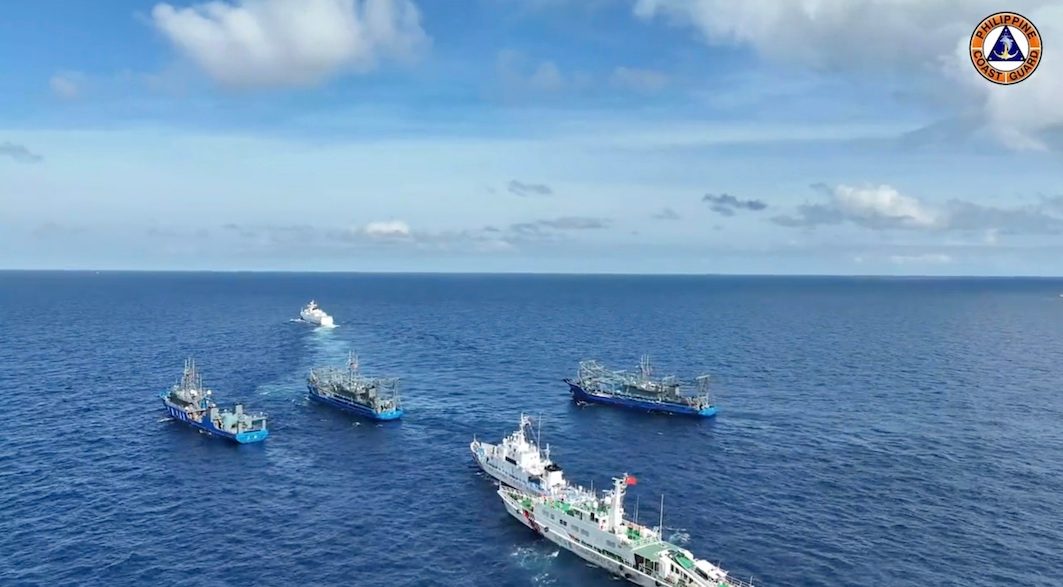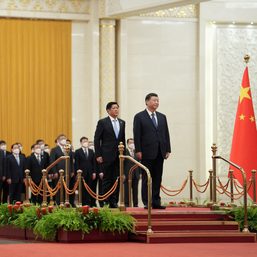SUMMARY
This is AI generated summarization, which may have errors. For context, always refer to the full article.

MANILA, Philippines – The Philippines and China, in a bilateral meeting on Wednesday, January 17, agreed to “improve [a] maritime communication mechanism in the South China Sea,” starting 2024.
“This includes communications between foreign ministries and coast guards of the two countries,” added the Philippines’ Department of Foreign Affairs (DFA) in a statement released Thursday, January 18.
China’s Ministry of Foreign Affairs had earlier released its own statement, saying China’s Assistant Foreign Minister Nong Rong and the Philippines’ Foreign Undersecretary Theresa Lazaro held a “frank and in-depth exchange of views” during the 8th Bilateral Consultation Mechanism on the South China Sea held in Shanghai.
Why is agreeing to improve a maritime communication mechanism crucial in the context of the South China Sea and, specifically, the West Philippine Sea?
Communication lines between the two nations, particularly on South China Sea issues and incidents, have long existed.
But under President Ferdinand Marcos Jr., there was a push to improve these lines of communication.
Among the highlights of his first state visit to Beijing in January 2023 was the finalization of an agreement to create a “communication mechanism on maritime issues” between China’s Ministry of Foreign Affairs and the Philippines’ DFA.
The mechanism is a hotline of sorts for diplomats to communicate in real time when there’s an incident in the South China Sea.
The communication mechanism, however, took a while to set up, and even when it was finally in place, Beijing was not always quick to pick up.
In August 2023, as the Chinese Coast Guard (CCG) used water cannons on Philippine Navy-contracted ships during a resupply mission to an outpost in Ayungin Shoal in the West Philippine Sea, Beijing did not respond and acted only hours later, said the DFA.
The department, in its protest, asked China to “reciprocate with the same sense of urgency” that Manila shows when Beijing calls.
Manila last used the communication mechanism in December 2023, when the CCG again used water cannons on Philippine ships – both in Ayungin Shoal and Scarborough Shoal, in back-to-back incidents that capped off a tense year in the West Philippine Sea.
That communication in December 2023 was used to lodge the Philippines’ “diplomatic protest with the Chinese Minister of Foreign Affairs counterpart through a phone call.” The call was followed by a protest by the Philippine embassy in Beijing and a summoning of the Chinese ambassador in Manila.
Ayungin Shoal, a feature over 100 nautical miles away from the coast of Palawan, is a flash point between the two countries. The shoal is within the Philippines’ exclusive economic zone, but is claimed by China as its own.
China has stood by its sweeping claim of the South China Sea, exemplified by the 9-dash line that has since evolved into the 10-dash line. Beijing insists on that claim, even if a 2016 arbitral award determined that it was invalid.
Standing as Manila’s outpost in Ayungin Shoal is the rusting BRP Sierra Madre, a World War II ship where a handful of Marines stand watch. Resupply missions bring them much-needed supplies. They are also meant to rotate troops – soldiers assigned to Ayungin ought to stay there only for weeks at a time.
Without revealing details, the DFA said that during the meeting in Shanghai, “both sides agreed to calmly deal with incidents [in the South China Sea], if any, through diplomacy.”
The DFA said: “They also agreed that continuous dialogue is important to keep peace and stability at sea. Both sides presented their respective positions on the Ayungin Shoal and assured each other of their mutual commitment to avoid escalation of tensions.”
China also insists that the Philippines previously promised to remove the BRP Sierra Madre – a promise Marcos has said either does not exist or has already been revoked.
A January 2024 resupply mission to Ayungin has yet to take place, owing to unfavorable conditions at sea. – Rappler.com
1 comment
How does this make you feel?







![[Just Saying] SONA 2024: Some disturbing points](https://www.rappler.com/tachyon/2024/07/TL-marcos-sona-points-july-23-2024.jpg?resize=257%2C257&crop=335px%2C0px%2C720px%2C720px)

Highly noted: “Without revealing details, the DFA said that during the meeting in Shanghai, ‘both sides agreed to calmly deal with incidents [in the South China Sea], if any, through diplomacy.'” First, the DFA did not reveal the details of such a meeting. Is this evidence of a Lack of Transparency? Do the Filipino people not have the right to know? Secondly, who needs communication when the answer is still the same? Thirdly and lastly, is this not a continuing delaying tactic?